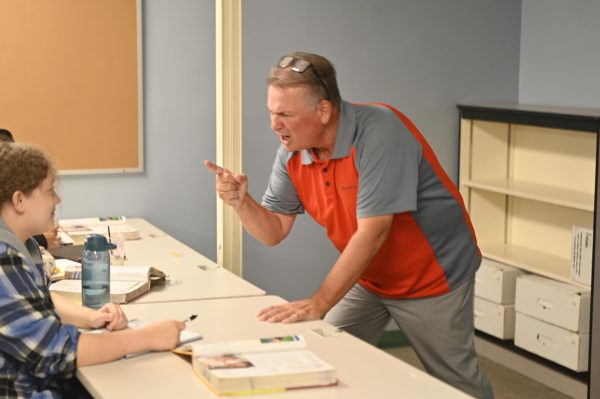Lakeland High School (LHS) has a diverse range of teachers that are brand new, and teachers who have been here for decades.
Each one has been on a journey that ultimately leads them to the classroom.
They hold a collection of experiences that shaped how they connect with students, approach issues, and an educator as a whole.
It’s easy to assume teachers go directly from school into the classroom, but that’s rarely how it happens. Many teachers at LHS have worn different uniforms before becoming a teacher. A math teacher could’ve worked for customer service, so that’s why they have patience. Or a welding teacher could’ve previously worked for a factory, so they’re good with handiwork.
Mike Pitassi, before becoming an English teacher at LHS, worked at a bookstore. Pitassi worked at a store called “Borders”, which was located in California before it shut down.
Although it is no longer there, the store left a lasting impact on Pitassi. Constantly surrounded by books, Pitassi’s love for literature only grew fonder.
Pitassi was inspired to become a teacher by previous impactful English teachers he had growing up and his love for books and literature. His teachers’ impact stuck with him, inspiring him to pursue a career where he could pass on that inspiration to his students.
“Working at the bookstore expanded my knowledge with books and helped me connect with people,” Pitassi said.
LHS health teacher, Brian Williams, followed a very different path. Before working for Lakeland, Williams worked for 13 years at Auburn University. On staff for their Division 1 football team, it was demanding.
Eventually, he left due to the lack of free time the job required. 
Williams wanted to spend more time being a dad.
“It prepared me for working with people that had great variation in their abilities.” Williams said.
Though Willams spent many years with the team, teaching was his true calling. Williams had always wanted to be a teacher, but took the coaching path. But ultimately came back to pursue his dream.
Lauren Faulkner, a history teacher at LHS, also brings a unique perspective on what shaped her career choice. While attending college, Faulkner was a waitress, a job that taught her valuable lessons in patience, problem solving and communication. These skills eventually transferred from the restaurant to the classroom.
“I learned a lot of communication and listening skills being a waitress,” Faulkner said.
Faulkner had the passion of becoming a teacher since she was in first grade. Her freshman and sophomore year history teacher ignited this passion.
Her teachers’ influence motivated her to teach this subject.
These backstories from Williams, Pitassi, and Faulkner highlight the truth behind teaching.
It is not just a career, but a grouping of experiences and personal passions.
Whether it’s the patience learned from customer service, the discipline on the football field, or the empathy developed while waiting tables, these experiences shape how teachers approach their work.
In addition to their individual journeys, what stands out about the teachers at LHS is how they use their past experiences to easily build relationships with their students. They don’t just educate, they relate, empathize, and inspire.
Each of their backgrounds allow them to guide students who are near starting their careers.
Students also benefit from having teachers with such varied backgrounds by bringing real world experiences and knowledge into the classroom, making lessons more intriguing and relatable.
When a teacher shares a past experience with a student, it makes the student engaged, and helps them prepare for what’s outside of high school.
Backstories also show that career paths don’t always go as planned. Growth, exploration, and change are huge factors in finding a career. Students will learn that they don’t need everything figured out, and it’s encouraging for those who are unsure about what they want to do.
LHS is full of role models, mentors, and learners.
Each story offers students a glimpse of the different paths that can lead to a fulfilling career.